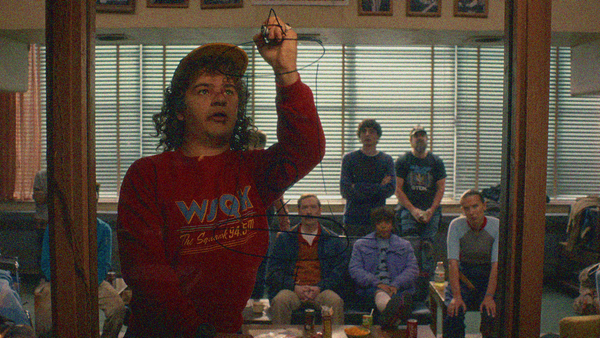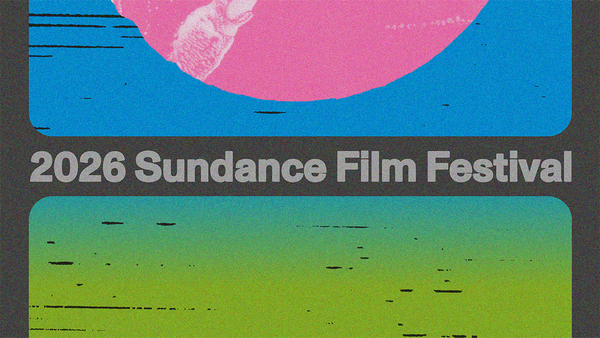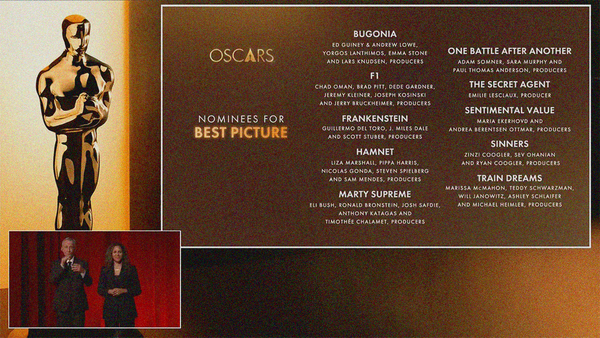Week Ending 4/18/25
Spring has sprung

After not listening to a new album until July or later the past two years, I’m actually caught up coming into today’s new crop (as far as my Spotify favorite artists and Wikipedia’s new release page go since there aren’t any “Best of the year so far” pieces from publications that I can take new suggestions from yet). Not only does this mean I won’t have to cram in the fall to compile my end of year mix, but it also means I get weeks like this one where I can put my shortlist on shuffle and become more familiar with the current candidates.
My faves right now:
- “Mount Analogue” by SPELLLING
- “Pulse Drips Quiet” by Sleigh Bells
- “I’ll Be Gone” by SASAMI
- “Undecided” by SAINt JHN
- “More Than Life” by The Horrors
- “Lie 95” by Bartees Strange
- “POMPEII STATUES” by Benjamin Booker
- “What You’ve Lost” by The Old Mervs
- “Happy People” by Nao
- “The Iron Rose” by The Mars Volta
What I Watched:
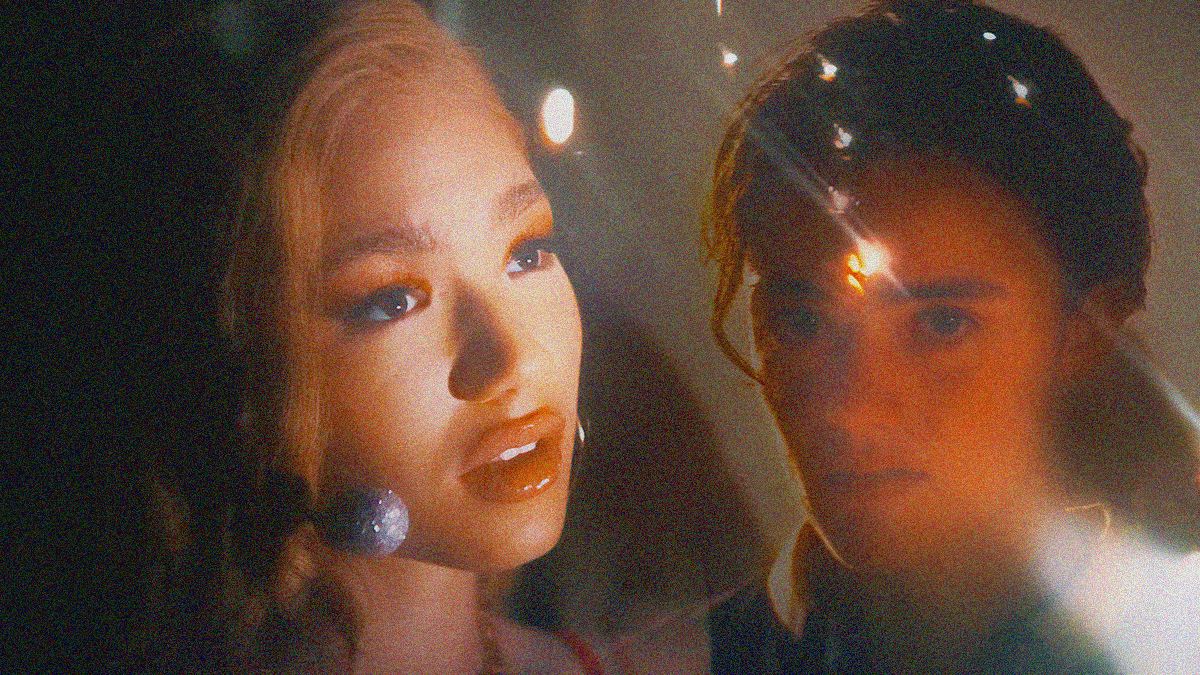
QUEENS OF DRAMA
(limited release)
It's been fifty years since Mimi Madamour (Louiza Aura) and Billie Kohler (Gio Ventura) met backstage during auditions for the televised singing competition "Starlet Factory". No one knew then that they'd end up with a stranglehold on the music-loving public for a decade. No one knew that they were in love either. Because that fateful afternoon put them on diverging paths despite their blossoming romance. One would prove victorious on the show en route to making all her stardom dreams come true while the other would be thrown off the lot and left to wonder if she'd also be forgotten by the person who said they'd be together forever.
Rather than tell this story from their perspectives, Queens of Drama director Alexis Langlois (who co-writes with Carlotta Coco and Thomas Colineau) introduces a third character by way of SteevyShady (Bilal Hassani). Forgotten by the public who knew him for his controversial YouTuber antics—much like those aforementioned idols—he decides to log-on and commemorate this auspicious occasion by telling the world (us) the real story of Mimi and Billie. Their affair. Their falling out. Their successes and failures. Everything SteevyShady loved so much that he leveraged his stalker behavior into becoming a rabid fan/critic and everything he abhorred enough to do his part to ruin their lives.
This choice revels in celebrity's fabrication. The artists, financiers, publicists, and fandom are all manufactured arms of the same capitalistic image machine, desperate to jack into the current zeitgeist long enough to make a few millions before it inevitably disappears. Mimi and Billie launch themselves on the ideal set before them by the previous generation (Asia Argento's Magalie Charmer and Mona Soyoc's Elie Moore) in the hopes of mirroring their highs and avoiding their lows. Parasites like Guy Brilland (Thomas Poitevin) seek to control them by ingratiating themselves on their brand before jumping to the next "hot thing." And SteevyShady's parasocial relationship to it all lets him go along for the ride until discovering hate sells quicker than adoration.
Is this an apology? Not really. It may seem like one at first considering SteevyShady admits his part in the circus, but he's also telling Mimi and Billie's story on his terms. He's once again using their notoriety to augment his own. First it was via the fictional "friendship" he formed with Mimi (complete with great Chris Crocker homage). Then it was the weaponized vitriol of taking her and Billie down in the most attention-seeking way. And now it's through the nostalgia of a milestone regardless of whether the world even remembers who they are ... let alone him. Langlois could have achieved a similar satirical glimpse into the "fifteen-minutes" machine by having Mimi and Billie start a podcast to set the record straight too. There are infinite ways to profit off success (and its loss) whether yours or someone else's.
Beyond the obvious industry commentary, however, is also the unfortunate realization that audiences (not critics) ultimately gate keep what art is allowed to be "great." Because this should simply be a love story between two artists who come together to make their lives and careers better. Instead, it's about mainstream appeal and the changing status quo. It's about Mimi only being able to hit it big if she projects a Cishet aura that sticks to the popular consensus that female vocalists must be lusted after by men and envied by women to be worthy of a consumer's time. So, she can't declare her love for Billie. She can't cheat on her forced gender identity or music genre. Not if she wants to rule the world.
This type of consensus is fickle, though. The masses tire of what worked in the past and seek a newer, flasher toy for the future. So, when Mimi's star unavoidably begins to wane, it's only logical that Billie's punk-infused counterculture mystique (dialed to eleven once her heart gets broken) would fill the void. The people are rejecting the "good girl" trend and jumping on the bandwagon of "bad girl" danger. Lock your doors. Hide your daughters. The fake glam of sanitized pop buckles under the grungy allure of rebellion. Parents want their kids to aspire towards Mimi, so the kids choose to rebuke their parents and idolize their worst nightmare instead.
Yet it's all still a lie. Because the moment the truth arrives, whatever good will either starlet received is erased in an instant. It's no longer about what parents or children want. Now it's about the tastemakers and influencers. You don't need to actually like it. You must only say that you do so you aren't left on the curb. Mimi is really a drug-loving wild child? Billie's transgressive aesthetic is based in plastic pop motif? They've been lying to us?! How dare they! We must revolt. We must prove that we are the most important part of this equation. Not the artists. Not the art. No, it's our narrative. But, as SteevyShady learns, not even that survives.
The messaging is sound with a package dripping in gender queer excess. That the music is catchy and fun almost becomes an afterthought since the lyrics and style are more a tool for the themes than the plot. You must only watch a drag show remix of three songs (two by Mimi and one by Billie) to realize how intent can be twisted to serve another's needs. Because even if Langlois delivers what we want (for Mimi and Billie to block out the noise and be their true selves together), it was never what the people wanted. At least, not in the way they should have wanted it. First it would have been "too gay." Now it's too "sentimental." So, if they must have it, they will rejoice in the mess with hare. They'll make it about themselves ... as they always do.
- 7/10
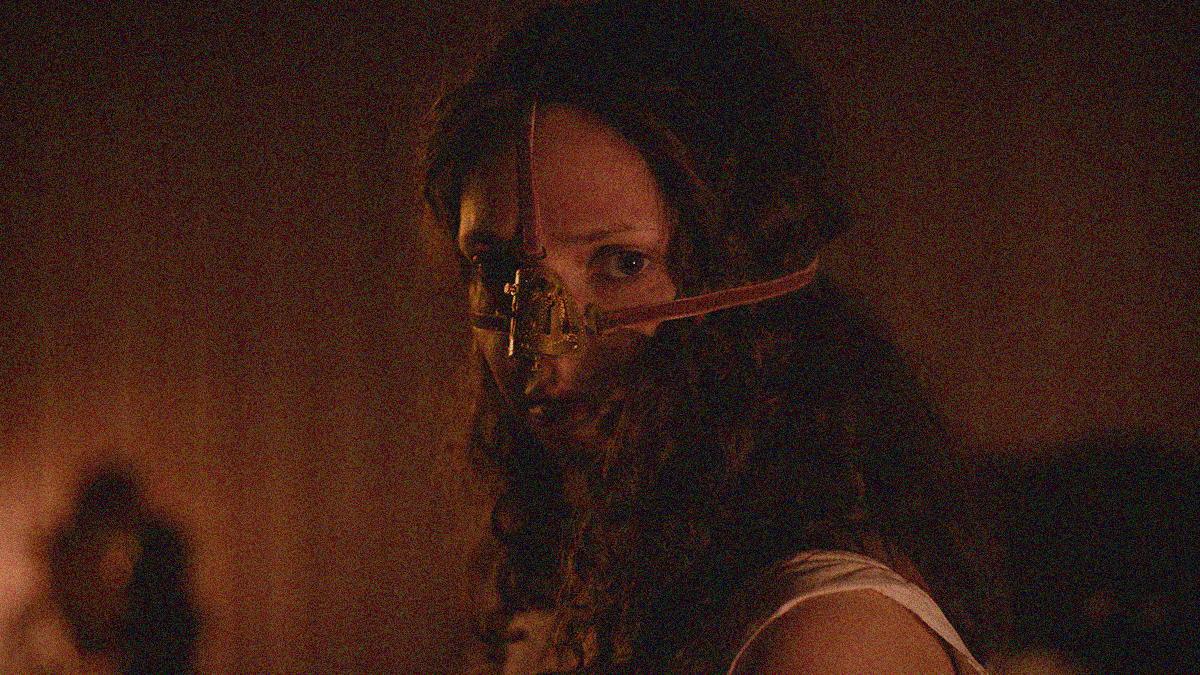
THE UGLY STEPSISTER
[Den stygge stesøsteren]
(in theaters)
I built up in my head that Emilie Blichfeldt's The Ugly Stepsister was a "Cobra Kai" variation on Cinderella. I'm not exactly certain why that is, but things did start to play out that way on-screen for a bit. Elvira (Lea Myren) is just a young girl trying to fit into a new world after her mother (Ane Dahl Torp's Rebekka) remarries. And when her new husband dies, the child hopes to still cultivate a bond with stepsister Agnes (Thea Sofie Loch Næss). Unfortunately, the latter doesn't feel the same. Because while she may no longer be rich, Anges always lived like she was. She never wanted a new mother and siblings. She merely went along with it because her father was broke. It simply turns out that Rebekka was too.
So, when Elvira seeks to comfort Agnes in her grief only to receive bile in return, I prepared myself for this fairy tale's twist to render the usual heroine into the villain and the villain into the heroine. It wasn't long, however, before I realized that wasn't Blichfeldt's intent. No, things ultimately progress exactly as we know them to whether via Disney or Brothers Grimm. The difference, beyond spotlighting Elvira as our main perspective, is the light in which that progression is shone. Rather than present it as a fantasy come true for young girls to dream of becoming the trophy on a royal's arm, Blichfeldt lays that patriarchal misogyny bare. Because that's the true motivation behind such storybook romance: the desire to satisfy a man for survival in hopes he might satisfy you too.
This notion runs through the entirety of the film from top to bottom. It's why Rebekka moves her "hopeless daughters" (Elvira and her hasn't-hit-puberty-sister Alma, played by Flo Fagerli) so far away. It's why Prince Julian's (Isac Calmroth) decree for his ball demands "noble virgins" and not simply "eligible nobles." It's why Agnes resigns herself to pursuing the prince's hand in marriage despite already being in love with the stable boy (Malte Gårdinger's Isak). Why Rebekka weaponizes Elvira's dream of being a princess to let her mutilate her body in pursuit of the sort of beauty necessary to earn matrimonial revenue. And even why the local finishing school's headmistresses choose to beat autonomy and individualism out of their students so each becomes a docile plaything instead.
Therein lies the nightmare of what transpires. The malicious punishment of Agnes for daring to love someone on her own terms that labels her a "whore"—the age-old double standard wherein Julian's friends want to have sex with everyone that moves while treating everyone who complies like trash for "allowing" it regardless of consent. The body horror Elvira endures at an esthetician's chisel and by her own hand when deciding to go on a tapeworm diet. Rebekka's self-prostitution to "pay" for all the classes, surgeries, and clothes she prays will make her eldest daughter palatable enough to recoup everything once she moves into the royal castle. And, the most genuinely entertaining piece of this cesspool, the monstrousness of men drooling with hedonism as animal instincts reign.
So, well it's not quite what I was expecting, The Ugly Stepsister remains an intriguing re-telling via its shift in packaging. It also does the whole "what makes a villain a villain" thing that's ruining Hollywood correctly by presenting how society creates its monsters. That doesn't mean we must empathize with Elvira's actions since they are still objectively cruel. We're merely able to show her pity alongside our hate. And, similarly, we are able question Agnes' motives when she proves cruel herself without forgetting that it doesn't negate her own victimhood. Every woman on-screen is a victim regardless of their predatory, opportunistic, and petty ways. Because they are being forced into these roles by the deplorable men who refuse to accept them as equals. It's Feminism 101.
And this look behind the fairy tale curtain is driven by an extremely dedicated performance from Myren. The physical comedy and horror she provides is unforgettable as she must constantly turn on a dime from innocent wallflower to empowered mean girl depending on how the world around her accepts her ongoing transformation today. And the gruesome finale is nothing without her crippling desperation. All that work and pain she's endured to find herself needing to slide face-first down two flights of stairs says everything. Because it was never about doing what she wanted. Everything, even the poetic indoctrination of her favorite book (supposedly written by Julian himself) promising happiness, was about what he wanted. Elvira never stood a chance.
- 7/10

THE WEDDING BANQUET
(in theaters)
“The true highlights are Youn and Chen. Comedic timing, poignant pathos, and an authentic understanding in how they learn and grow to be what Min and Angela need even if it took them longer than it should.”
– Full thoughts at The Film Stage.
Cinematic F-Bombs:
This week saw Anchorman 2: The Legend Continues (2013), Barbershop: The Next Cut (2016), Clear and Present Danger (1994), Fast X (2023), Jack Ryan: Shadow Recruit (2014), The Sum of All Fears (2002), Transformers (2007), Transformers: The Last Knight (2017), Transformers: Rise of the Beasts (2023), and Venom: The Last Dance (2024) added to the archive (cinematicfbombs.com).
James Cromwell dropping an f-bomb in The Sum of All Fears.
New Releases This Week:
(Review links where applicable)
Opening Buffalo-area theaters 4/18/25 -
Arjun S/O Vyjayanthi at Regal Elmwood
Colorful Stage! The Movie: A Miku Who Can't Sing at Regal Elmwood, Transit, Galleria, Quaker
Kesari Chapter 2: The Untold Story of Jallianwala Bagh at Regal Elmwood
Sinners at Dipson Flix, Capitol; AMC Maple Ridge, Market Arcade; Regal Elmwood, Transit, Galleria, Quaker
Sneaks at Dipson Flix, Capitol; AMC Market Arcade; Regal Elmwood, Transit, Galleria, Quaker
That They May Face the Rising Sun at North Park Theatre (select times)
The Ugly Stepsister at Regal Elmwood, Transit, Galleria, Quaker
Thoughts are above.
The Wedding Banquet at Dipson Amhert, Capitol; AMC Maple Ridge; Regal Elmwood, Transit, Galleria, Quaker
Thoughts are above.
Streaming from 4/18/25 -
Companion – Max on 4/18
Dead Mail – Shudder on 4/18
Grand Tour – MUBI on 4/18
Quick thoughts at jaredmobarak.com.
iHostage – Netflix on 4/18
Oklahoma City Bombing: American Terror – Netflix on 4/18
The Order – Hulu on 4/18
“Their story unfolds linearly and without much flourish, but that's to its drama's benefit by keeping things lean while still ramping up the stakes. I was invested from the opening prologue of backwoods murder straight through to its fiery finale.” – Full thoughts at HHYS.
Wolf Man – Peacock on 4/18
The Room Next Door – Netflix 4/19
Quick thoughts at jaredmobarak.com.
Pangolin: Kulu’s Journey – Netflix on 4/21
The Return – Paramount+ on 4/21
Bullet Train Explosion – Netflix on 4/23
Now on VOD/Digital HD -
Captain America: Brave New World (4/15)
Darkest Miriam (4/15)
“I'm left wondering how much more of Darkest Miriam on-screen would make sense if I read Baillie's words. Or maybe the film just wasn't for me.” – Full thoughts at HHYS.
The Day the Earth Blew Up (4/15)
“While the over-arching narrative design hews close to the threat inherent to [1950s sci-fi], however, this remains a Looney Tunes property and thus needs a joke premise behind it. Queue the introduction of the Goodie Gum bubblegum factory.” – Full thoughts at HHYS.
Eephus (4/15)
“The result is a low key affair with small town guys being dudes. They're mostly all attempting to tell each other how much they appreciate this time together without actually saying the words.” – Full thoughts at HHYS.
The Woman in the Yard (4/15)
A Working Man (4/15)
Grand Tour (4/18)
Quick thoughts at jaredmobarak.com.
Grassland (4/18)
It Feeds (4/18)
Thanks for reading Hey, have you seen ...?! Subscribe for free to receive new posts and support my work.

